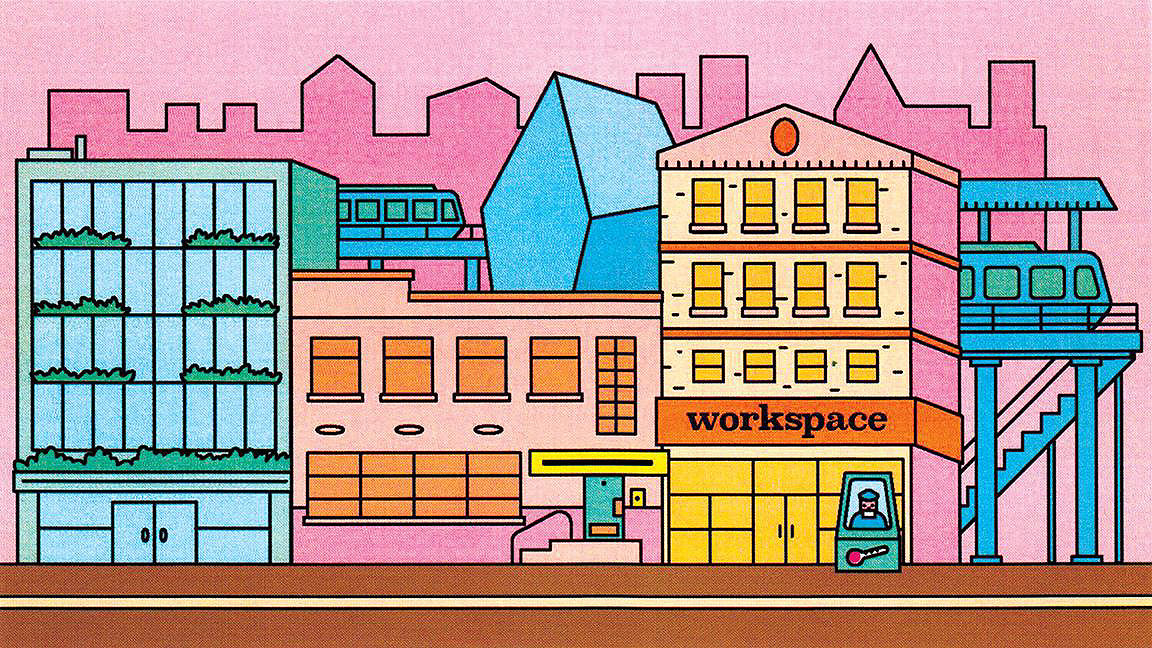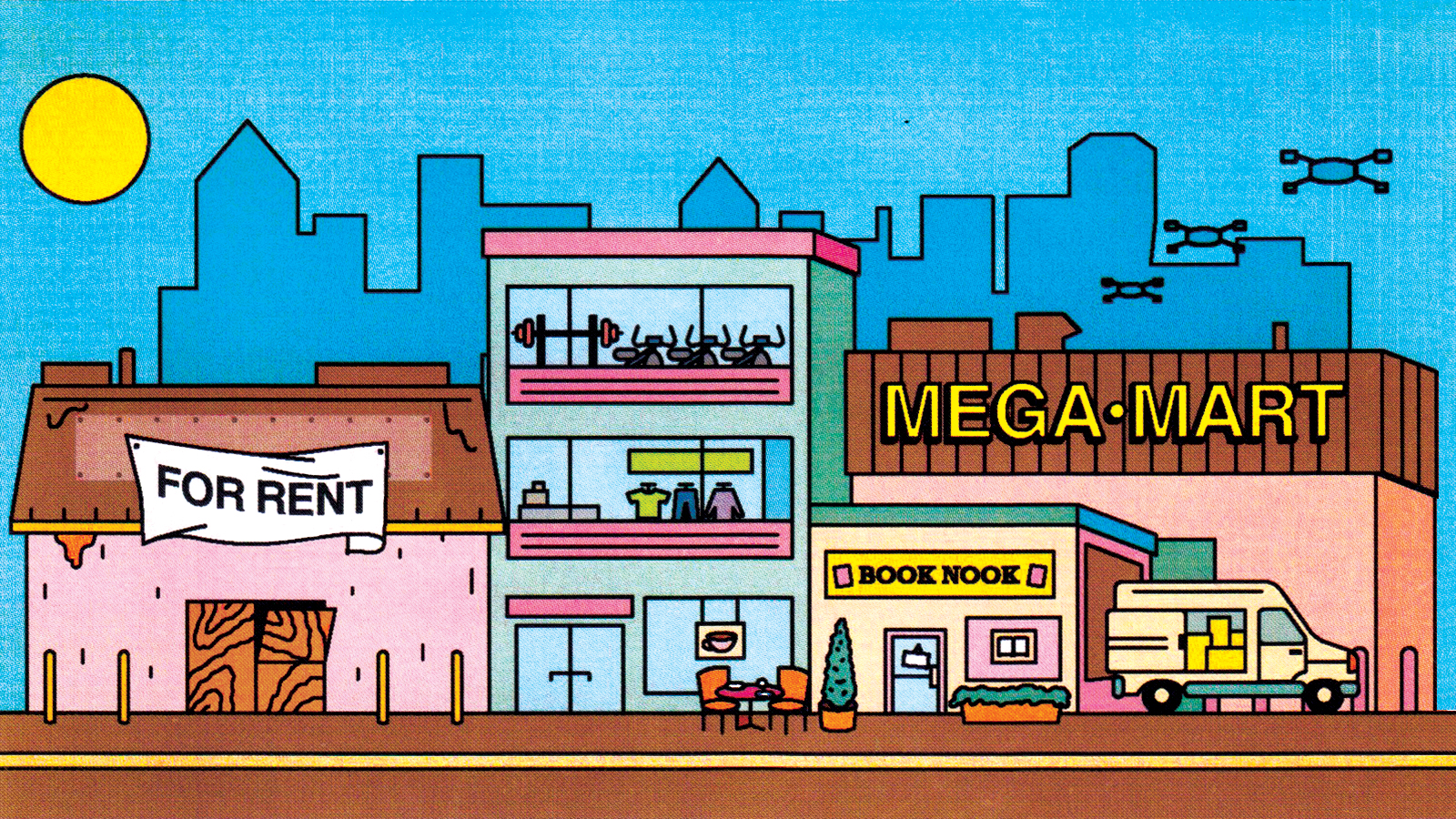
Illustration: George Wylesol
Most real estate investors anticipate the pandemic-accelerated trend towards flexible and home working will affect the office sector. But whether that will mean more or less demand for space across the various asset types and locations, remains difficult to know until the landscape of the post-pandemic market is revealed. For valuers, that means appraising office property has become a lot more complicated.
1: ESG moves to the head of the agenda.
The pandemic has brought the issues of sustainability, health, wellbeing and the social impact of investment to the foreground. Occupiers’ ESG record is increasingly important for their business performance and ability to recruit, observes Noëlle Brisson FRICS, a US-based valuer and co-founder of real estate cybersecurity platform CyberReady. “When valuers look at the credit quality of tenants, they need to drill down into what they are doing about ESG.”
Meanwhile, tenants’ determination to take only high-performing buildings has strengthened the link between sustainability and value, argues Christy Bowen MRICS, head of the Central London valuation team at JLL. “For years we have been trying to quantify the premium for having good green credentials. But quite quickly instead of there being a premium, there will be a discount for anything that does not satisfy those requirements.”
2: Core comes to the fore.
In a crisis, investors flock to prime property, while higher-risk assets languish. “Large investors have targeted super-core office property. There is incredible pricing for long-let assets, with prime yields that were never achieved before the crisis. While the secondary sector has been, with a few exceptions, quieter than before.” says Andreas Röhr FRICS, executive director of JLL’s valuation and transaction advisory team in Germany.
The same trend has been apparent across other global markets in the pandemic, including Singapore. Cynthia Ng FRICS, managing director, valuation and advisory, at Savills’ office in the Asian city-state, observes: “There is a very limited supply of quality offices in the prime Marina Bay area and most of those are locked into long leases, so we do not see an impact on value in the short term, but offices in secondary locations may see some difficulty.”
3: A suburban office resurgence?
The jury is out on whether former commuters will return to city centre offices after the pandemic, or whether some will make increasing use of suburban locations closer to home, or more accessible by car. “Valuers must look at what kind of office space will be needed in the future. How long will it take for people to feel comfortable enough to go on a subway or sit in the office?” muses Neil Axler MRICS, managing director at B. Riley Advisory Services in New York. “Suburban offices will get a new lease of life, and the tertiary cities will do better because with remote working businesses can hire from around the country now.”
Others are sceptical, however. Marcus Badmann FRICS, managing director of real estate valuation at German advisors Bulwiengesa, believes the pandemic will have only a short-term impact. “At the end of COVID-19 we will go back to what we had as normal before. People seek the culture of city centres,” he argues.
4: Valuing flexibility.
Co-working operators have suffered in the pandemic, but flexible working is forecast to be a dominant trend in the post-pandemic future. “Everything in the office sector is going to have some sort of flexibility in it,” predicts Andrew Skinner MRICS, valuation director in Savills’ London office. “The operational valuation approach is the new paradigm. Everything in the real estate industry will be about space as a service.” He adds that serviced office operators anticipate greater demand from occupiers seeking to flex their office space to enable more home working, and are looking to sign management agreements with property owners instead of leases.
Meanwhile traditional office landlords are developing flexible solutions of their own to market directly to users. “We will have to get used to valuing a mix of different types of incomes from serviced and traditional office space within one building,” says Skinner.
“Down the road it will also be more important than ever for appraisers to project where the economy is going” Neil Axler MRICS, B. Riley Advisory Services, New York
5: Understanding the business context.
As government relief packages expire, and the economic costs of the virus become fully apparent, valuers must do their research on whether income from tenants can be relied upon, suggests Axler. “In the past you might have been able to say more confidently that there is a probability that a tenant will renew this lease at a certain rent. Now you are going to look a lot more closely at expiries and break options. Valuers have to talk to managers to find out the strength of the tenant. And down the road it will also be more important than ever for appraisers to project where the economy is going.”

Get involved: RICS Standards & Regulation Board has commissioned an independent review of real estate investment valuation practices. We welcome feedback from RICS professionals, stakeholders and consumers by 31 March 2021. Please go to our website for more details.

Next month: how has the hospitality sector been affected by COVID-19? And what does that mean for those who value it? We ask the experts.
“Everything in the office sector is going to have some sort of flexibility in it” Andrew Skinner MRICS, Savills, London



-29-Mar.jpg)